M8 Unit2
M8-unit2
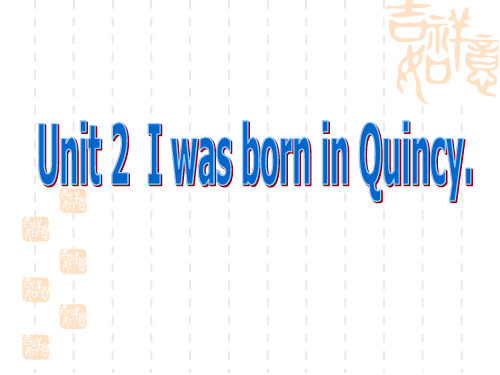
Listen and retell
Paragraph 3 big, living room with , a kitchen, three , On, posters, movie stars.
Listen and retell
Paragraph 4 a big garden, a pond, great to play.
Complete each sentence with the correct word.
friendly naughty unfriendly well-behaved
1. He does what the teacher tells him. He is well-behaved ___________. unfriendly 2. She doesn’t speak to me. She’s ________. naughty 3. They are very _______. They don’t listen to the teacher. 4. Our teacher talks to us and asks us about our lives. She’s _________. friendly
president with store movie baseball living room kitchen bathrter n. garden n. pond n. fish n. go back somewhere n. unfriendly adj. partner n. character n.
4. 【问】 There was a big living room with a TV. 中 with 有什么用法? 【答】 with是介词,意思是“带有”, e.g: I forgot to take money with me. 我忘了带钱。
M8U2
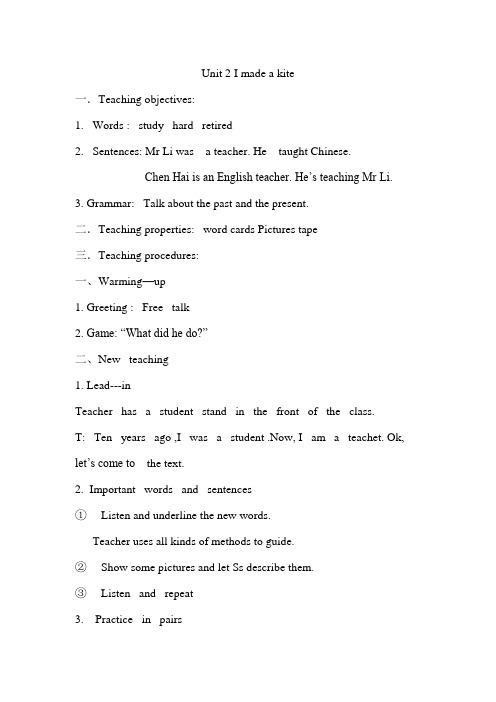
Unit 2 I made a kite一.Teaching objectives:1. Words : study hard retired2. Sentences: Mr Li was a teacher. He taught Chinese.Chen Hai is an English teacher. He’s teaching Mr Li. 3. Grammar: Talk about the past and the present.二.Teaching properties: word cards Pictures tape三.Teaching procedures:一、Warming—up1. Greeting : Free talk2. Game: “What did he do?”二、New teaching1. Lead---inTeacher has a student stand in the front of the class.T: Ten years ago ,I was a student .Now, I am a teachet. Ok, let’s come to the text.2. Important words and sentences①Listen and underline the new words.Teacher uses all kinds of methods to guide.②Show some pictures and let Ss describe them.③Listen and repeat3. Practice in pairsShow a picture of sports player .Have Ss say out the differentces between the pictures.(use the important sentences) Show three pictures and have Ss compare.4. PronunciationHave Ss listen and repeat. Put these words on the Bb. Let them find the similar pronunciation. Follow the tape two times.5. Say a poemLook. Listen and follow the tape. Then say together with actions.三、SummaryHave Ss sumlesson. Teacher gives complement.四、HomeworkRead the text and make a kite.。
新外研版八年级上册M8U2公开课
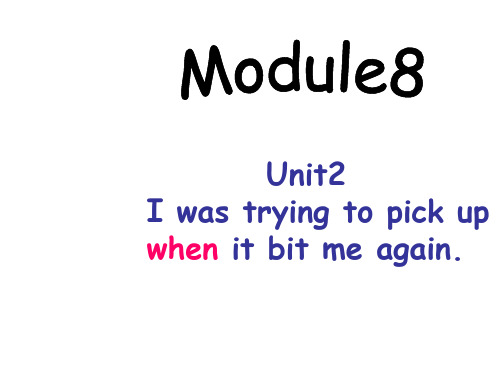
Use the technology , it may help you.
a) they knew what kind of snake bit him
b) they saw the snake in the photo
c) he left hospital the next day
Which paragraph is the main idea of the passage?
Unit2 I was trying to pick up when it bit me again.
What can you do with a mobile phone?
make phone calls send messages listen to music take photos send emails take videos play games read novels
2. When Henry was trying to find the snake, _____. a) he could take a photo b) the snake became cool c) his hand began to hurt badly
3. Henry hurried to hospital because _____.
a) his hand was hurting
b) he had a photo of the snake
c) the doctors called him on his mobile phone
4. The doctors gave Henry the right medicine after _____.
六年级英语上册M8Unit2Ioftengoswimming知识清单外研版三起
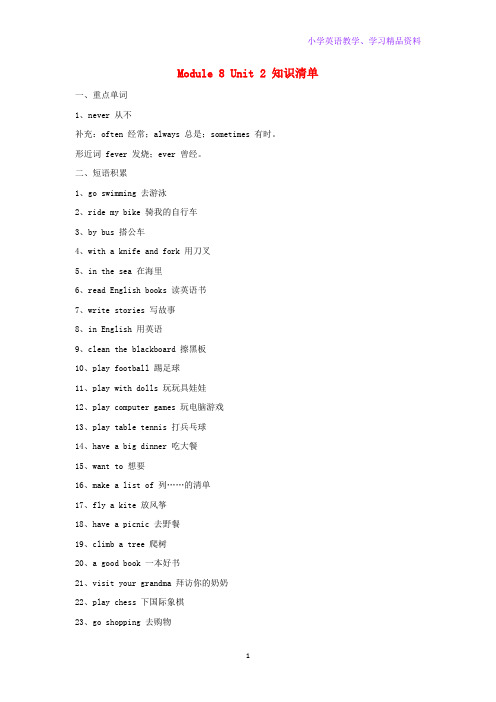
一、重点单词1、never 从不补充:often 经常;always 总是;sometimes 有时。
形近词 fever 发烧;ever 曾经。
二、短语积累1、go swimming 去游泳2、ride my bike 骑我的自行车3、by bus 搭公车4、with a knife and fork 用刀叉5、in the sea 在海里6、read English books 读英语书7、write stories 写故事8、in English 用英语9、clean the blackboard 擦黑板10、play football 踢足球11、play with dolls 玩玩具娃娃12、play computer games 玩电脑游戏13、play table tennis 打兵乓球14、have a big dinner 吃大餐15、want to 想要16、make a list of 列……的清单17、fly a kite 放风筝18、have a picnic 去野餐19、climb a tree 爬树20、a good book 一本好书21、visit your grandma 拜访你的奶奶22、play chess 下国际象棋23、go shopping 去购物25、drink tea 喝茶26、go to the doctor 去看医生27、collect stamps 收集邮票28、complete the table 完成表格29、watch TV 看电视30、play basketball 打篮球31、go to the supermarket 去超市32、cook dinner 做晚餐33、do homework 做家庭作业三、句型总结1、描述自己经常做某事:I often +动词原形(+其他)。
原句:I often go swimming.如果要表示别人经常做某事:主语+often+动词原形/动词第三人称单数(+其他)。
外研版八年级下册M8 Unit2(共20张PPT)

The tall, strangely shaped rocks are the most famous thing to see.
Number the sentences in the correct order. a) Betty pulled a leaf off a plant. b) The noise woke everybody up. c) They climbed Mount Tianzi. d) A monkey made some noise. e) They camped by a small lake. f) Lingling’s uncle said that people should protect everything in Zhangjiajie.
3. Is it safer to walk along a __p_a_t_h_ or climb over rocks?
4. Where do you __w_is_h__ you were right now?
Read the information about Zhangjiajie.
How large is it? about 480 square kilometres
Possible words: rocks beautiful tall green empty quiet famous unusual strange…
Pair work.
What do you know about Zhangjiajie? Can you answer the questions? 1. Where is it? 2. How large is it? 3. Where can you stay? 4. What animals can you see? 5. What is the most famous thing to see?
2024年外研社四年级英语上册M8U2-课件

1 选择适合的交通工具。
I‘m going to visit ____________by_________. Xinjiang Zoo Bei hai Gui lin USA Hong Kong
2 快速抢答。
What are you going to do?
① It’s sunny today.
I’m going to….
② It’s raining today.
I’m going to….
③ I’m very hungry.
I’m going to….
④ Travel.
I’m going to visit….
Listen and Answer
What is Amy going to do ? Amy is going to fly a kite. What is Daming going to do ? Daming is going to take some pictures. What is Sam going to do ? Sam is going to ride a horse. What is Lingling going to do ? Linling is going to row a boat. She’s going to fish too.
都二
能分
运浇
用灌
好,
“八
二分
八等
定待
律;
”二
,分
我管
们教
一,
起八
,分
静放
待手
花;
开二
。分
成
➢ Pure of heart, life is full of sweet and joy!
新外研版九年级上册英语M8Unit2课件

工作单位:北京外国语大 学附属中学
姓名:张华
工作单位:北京外国语大 学附属中学
制作时间
2023年4月1日 制作团队:英语教研组 审核时间:2023年4月5日 发布日期:2023年4月10日
教学目标
知识目标
掌握本单元的词汇和短语 理解并运用本单元的语法结构 提高阅读理解能力 提高口语表达能力
能力目标
提高学生的英语听说读写 能力
培养学生的英语思维能力
提高学生的英语交际能力
培养学生的英语学习兴趣 和自信心
情感态度与价值观目标
培养学生对英语学习的兴趣和热 情
培养学生的团队合作精神和社会 责任感
添加标题
添加标题
添加标题
添加标题
提高学生的自信心和自我表达能 力
增强学生的跨文化意识和国际视 野
展示目标:明确 本节课的学习目 标和要求
呈现材料:展示 本节课的学习材 料如课文、单词、 语法等
讲解要点:讲解 本节课的重点和 难点帮助学生理 解
练习环节
听力练习:播放 录音让学生听并 回答问题
阅读练习:让学 生阅读文章回答 问题
写作练习:让学 生根据提示写一 篇短文
口语练习:让学 生进行对话练习 提高口语表达能 力
学生作业布置与要求
作业类型:阅读、听力、写作、 口语等
作业量:根据学生能力合理安 排作业量
作业要求:明确作业要求如时 间、格式、内容等
作业反馈:及时反馈作业情况 给予学生指导和建议
THNK YOU
汇报人:
汇报时间:20XX/XX/XX
YOUR LOGO
重点:掌握一般过 去时的用法
添加标题
难点:理解形容词 的比较级和最高级 的用法在实际生活 中的应用
八年级上册英语m8u2课文
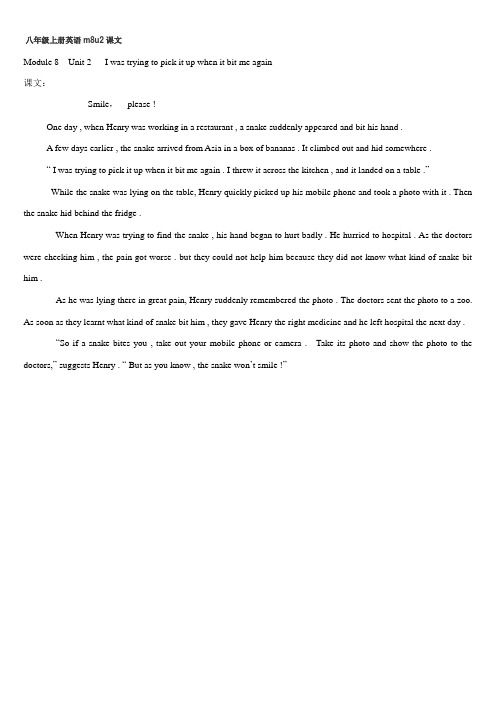
八年级上册英语m8u2课文Module 8 Unit 2 I was trying to pick it up when it bit me again课文:Smile,please !One day , when Henry was working in a restaurant , a snake suddenly appeared and bit his hand .A few days earlier , the snake arrived from Asia in a box of bananas . It climbed out and hid somewhere .“ I was trying to pick it up when it bit me again . I threw it across the kitchen , and it landed on a table .”While the snake was lying on the table, Henry quickly picked up his mobile phone and took a photo with it . Then the snake hid behind the fridge .When Henry was trying to find the snake , his hand began to hurt badly . He hurried to hospital . As the doctors were checking him , the pain got worse . but they could not help him because they did not know what kind of snake bit him .As he was lying there in great pain, Henry suddenly remembered the photo . The doctors sent the photo to a zoo. As soon as they learnt what kind of snake bit him , they gave Henry the right medicine and he left hospital the next day .“So if a snake bites you , take out your mobile phone or camera . Take its photo and show the photo to the doctors,” suggests Henry . “ But as you know , the snake won’t smile !”。
Module8Unit2 课件外研版英语八年级下册

表示“两个中的另一 个”, 表示特指, 总数 为两个。常用结构:
one. . . the other. . .
I have two pens. One is blue; the
other(pen)is black. 我有两支钢笔。一支是蓝色的, 另一支是黑色的。
表示“三个或三个以 This glass is broken. Get me
It’s in Hunan province.
2. How large is it?
It’s about 480 square kilometres(km2).
3. What is it famous for?
It’s famous for the strange shape of rocks.
4.What can you see there?
Read part 2 and finish the following tasks. Betty's travelling schedule(行程)
What's the writing order(顺序) of this part? A. Space order B. Time order
Read Para3 and answer the questions.
Betty took a trip to Zhangjiajie.
FROM: Betty Get the style of the passage.
TO:
Mum and dad
SUBJECT: Wonderful time in Zhangjiajie
receiver Dear Mum and Dad, 12.WHohwatmisaint,y paanreamgraaipl hosr(a自le然tt段er?)?
九年级上册英语m8u2课文
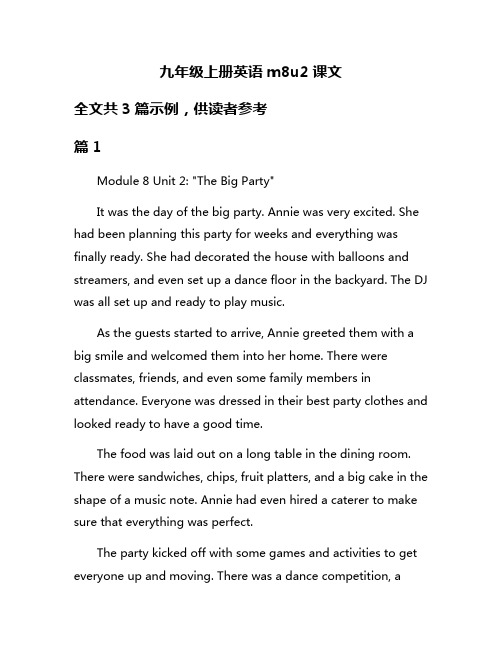
九年级上册英语m8u2课文全文共3篇示例,供读者参考篇1Module 8 Unit 2: "The Big Party"It was the day of the big party. Annie was very excited. She had been planning this party for weeks and everything was finally ready. She had decorated the house with balloons and streamers, and even set up a dance floor in the backyard. The DJ was all set up and ready to play music.As the guests started to arrive, Annie greeted them with a big smile and welcomed them into her home. There were classmates, friends, and even some family members in attendance. Everyone was dressed in their best party clothes and looked ready to have a good time.The food was laid out on a long table in the dining room. There were sandwiches, chips, fruit platters, and a big cake in the shape of a music note. Annie had even hired a caterer to make sure that everything was perfect.The party kicked off with some games and activities to get everyone up and moving. There was a dance competition, aphoto booth with silly props, and even a karaoke machine for anyone who wanted to showcase their singing skills. The guests laughed and danced and had a great time.As the night went on, Annie's friend Sarah pulled her aside. "I have a surprise for you," she said with a twinkle in her eye. Sarah led Annie to the backyard where a big screen had been set up. Suddenly, a slideshow of photos started playing – it was a montage of all the memories that Annie and her friends had created over the years.Annie was touched by the gesture and felt so grateful to have such wonderful friends. The party continued late into the night, with everyone enjoying themselves and celebrating Annie's special day.As the guests started to leave, Annie thanked each one of them for coming and making her party so memorable. She knew that she would never forget this night and the fun times she had shared with her friends and loved ones.Annie's big party was a huge success, and she couldn't have been happier. It was a night of laughter, music, and friendship –everything she had hoped for and more. And as she cleaned up the last of the decorations and turned off the lights, Anniecouldn't help but smile, knowing that she had thrown the best party ever.篇2Unit 2 of the ninth-grade English textbook is focused on the theme of "Cultural Exchange". The unit introduces students to various aspects of cultural exchange, including sharing customs, traditions, and beliefs. Through this unit, students not only learn about different cultures but also reflect on their own cultural identity.The unit begins with a text titled "A Visit to New York City", where students are introduced to the vibrant and diverse culture of one of the world's largest cities. The text describes the bustling streets, iconic landmarks, and various cultural attractions of New York City, allowing students to visually imagine themselves in this bustling metropolis.Following this, students delve into a text titled "Chinese Culture", which provides an in-depth exploration of the rich history and traditions of China. From ancient customs to modern practices, students learn about the significance of Chinese culture and its influence on the global community.Another text in this unit, "Cultural Exchange in the 21st Century", discusses how advancements in technology have facilitated cultural exchange on a global scale. Through social media, students can connect with individuals from different cultures, sharing experiences, ideas, and beliefs.To reinforce the concepts learned in this unit, students engage in various activities, such as group discussions, presentations, and cultural showcases. These activities allow students to further explore the themes of cultural exchange and gain a deeper understanding of the importance of cultural diversity.By the end of Unit 2, students will have developed a greater appreciation for different cultures, as well as a more profound understanding of their own cultural heritage. Through this exploration of cultural exchange, students are encouraged to embrace diversity, foster empathy, and build connections with individuals from all walks of life.篇3Unit 2 of Grade 9 English textbook is titled "Discovering the Past". This unit explores the topic of history and how we can learn from the past to better understand the present and future.The unit is divided into six lessons, each focusing on a different aspect of history and how it impacts our lives.Lesson 1: What is History?In this lesson, students learn about the definition of history and why it is important to study the past. They also explore the different ways in which history can be interpreted and how it shapes our understanding of the world.Lesson 2: Studying the PastStudents delve deeper into the methods and tools historians use to study the past. They learn about primary and secondary sources, as well as the importance of critically analyzing historical evidence.Lesson 3: Ancient CivilizationsThis lesson focuses on some of the early civilizations that laid the foundation for modern society, such as the Egyptians, Greeks, and Romans. Students examine the contributions of these civilizations to art, architecture, science, and philosophy.Lesson 4: The Middle AgesIn this lesson, students learn about the period known as the Middle Ages, including the rise of feudalism, the role of theCatholic Church, and the impact of the Black Death. They also explore the developments in art and literature during this time.Lesson 5: The Age of ExplorationStudents study the Age of Exploration and the voyages of explorers such as Christopher Columbus, Vasco da Gama, and Ferdinand Magellan. They analyze the motivations behind these expeditions and the consequences of European colonization.Lesson 6: The Industrial RevolutionThe final lesson focuses on the Industrial Revolution and its impact on society, including the rise of factories, urbanization, and social reform movements. Students explore the advancements in technology and the changes in working conditions brought about by this period.Overall, Unit 2 provides students with a comprehensive overview of different periods in history and encourages them to think critically about how the past has shaped the world we live in today. Through a variety of activities, discussions, and readings, students develop a deeper appreciation for the importance of studying history and understanding the lessons it can teach us.。
M8-Unit2柯林斯高级英汉双解词典
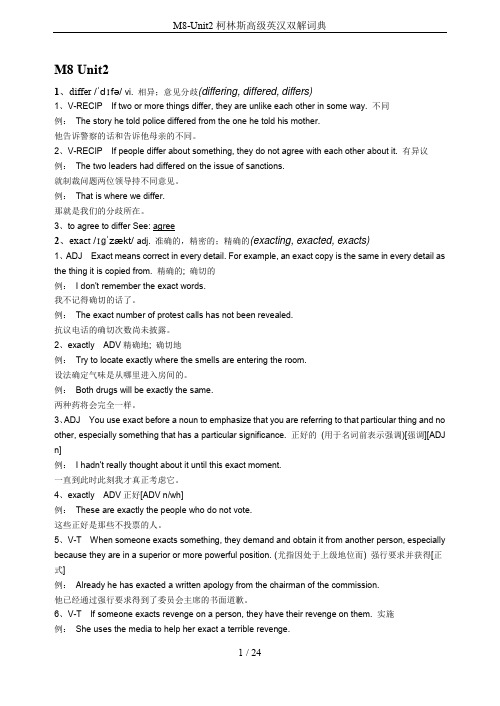
M8 Unit21、differ /ˈdɪfə/ vi. 相异;意见分歧(differing, differed, differs)1、V-RECIP If two or more things differ, they are unlike each other in some way. 不同例:The story he told police differed from the one he told his mother.他告诉警察的话和告诉他母亲的不同。
2、V-RECIP If people differ about something, they do not agree with each other about it. 有异议例:The two leaders had differed on the issue of sanctions.就制裁问题两位领导持不同意见。
例:That is where we differ.那就是我们的分歧所在。
3、to agree to differ See: agree2、exact /ɪɡˈzækt/ adj. 准确的,精密的;精确的(exacting, exacted, exacts)1、ADJ Exact means correct in every detail. For example, an exact copy is the same in every detail as the thing it is copied from. 精确的; 确切的例:I don't remember the exact words.我不记得确切的话了。
例:The exact number of protest calls has not been revealed.抗议电话的确切次数尚未披露。
2、exactly ADV精确地; 确切地例:Try to locate exactly where the smells are entering the room.设法确定气味是从哪里进入房间的。
外研版九下M8U2-PPT

C. If you stop trying,you can never succeed.
D. Don’t give up,and go on running.
(D)4. Which is NOT true according to the passage?
A. The speaker’s friends give much help to her.
Module 8 My future life
Unit 2 I know that you will be better at maths.
Think about a speech at a school leavers’ party What do you want to say?
Who are likely to be thanked?
are to thank three groups of people for the three most important things that I have learnt. These three things are friendship, effort and trust.
I give the red rose to my friends. When I started school here, my Chinese was not good, and some of my mistakes were very funny. I once tried to say “xiexie”,
better at maths.”
be good at 擅长
I’m sure that you all have your own memories about the happiness of the last three years, and the people whom you want to thank for it, so let’s all stand up and say, “Thank you, friends, teachers and parents! We love you!”
m8u2牛津知识讲解

m8u2牛津Module 8Unit 2 The universal languagePeriod 1 Welcome to the unitTeaching aims:After this lesson, students will be able to tell different types of music and musical instruments and they will also be able to talk about their favorite kind of music andfamous musicians.Teaching Aids:Multi-media,PPT, blackboardTeaching procedures:Step 1 Brainstorming1. Show students a picture of people from different countries and ask them how theycan communicate with each other.How do people from different countries communicate with each other?(They canspeak English since it is a language used widely in the world. They can drawpictures to get their ideas across. They can also use body language to show theirfeelings.)2. Get students to focus on t he topic of the unit “The Universal language”.If a language can be understood by all the people in the world, it is a universallanguage. So is English a universal language?(No, not everyone in the world canspeak and understand English.)What about pictures? Are they universal? (Yes. A picture can be appreciated bypeople all over the world.)Is body language also universal? (Yes, body language is more or less the samethroughout the world. It is a very effective way for people speaking differentlanguages to communicate with each other.)3. Draw students’ attention to the unit topic—music.There is also another kind of language which is universal. That is music. Why do wesay so? (Because people all over the world can understand music)Prepare the students with vocabulary related to music. Have them brainstorm anyword related to the kind of music, people related to music and musical instruments.Kinds of music: classical music, pop music, folk music, swing music, blues, jazz,rock and roll, rap, opera …People related to music: musician, singer, composer, pianist, violinist …Musical instruments: guitar, piano, violin, drum … Step 2 Free discussionHave the students talk about the following topics.1. Do you like to listen to music? What is your favorite kind of music? And why?(I likeclassical music very much. It uses orchestras and many instruments cooperating tocreate music together. You can hear things played on instruments from all of the different families. Also, classical music tends to be slower, so it makes me feel calm when I listen to it.)2. Do you know of any famous musicians?What do you know about them?(Themusician I like very much is Jay Chou. He sings about broken heart, urban stress and young dreams. He expresses his experiences, feelings and personality into his music, which attracts young people who have similar thoughts.)3. Have you ever watched an opera? What do you know about Chinese and Westernopera? (Yes. I watched Chinese operas with my grandfather when I was young. A Chinese opera performance includes elements like dance, dialogue, swordplay and acrobatics. The music instruments used for Chinese opera include gongs, cymbals, drums and stringed instruments. A character’s age, gender and personality areshown through the makeup, movements, props and color costumes. In comparison, Western opera puts greater emphasis on music and design, conveying a story through singing and dancing.)Step 3 Sharing information1. Picture of Mei LanfangDo you know who this person is? (The great Chinese Opera master Mei Lanfang.) He once gave several successful performances in the United States. How could they be so successful? (A character’s age, gender and personality are shown through the makeup, movements, props and color costumes. They are universal. People all over the world can understand them.)2. Picture of Louis ArmstrongDo you know who he is? (Louis Armstrong. He is one of the most famous jazz musicians in the United States.)What do you know about jazz?For example, when and where did it start? (It first started in the late 19th century in the United States.)3. Picture of PaganiniDo you know who he is? (Paganini, the famous violinist.)What kind of musical instrument violin is? (The violin belongs to the string family.It is made of wood and uses steel strings. A violinist uses a bow pulled across the strings to create beautiful music.)4. Picture of BeethovenWho do you think the man in the picture is? What do you know about him? (He is Beethoven, a famous pianist and composer from Germany.)What do you know about the piano? (The piano belongs to the percussion family of instrument. It consists of a keyboard attached to a wooden box, inside of which are metal strings. A piano is played by pressing the keys.)Step 4 Homework1. Write a short passage about your favourite musician.2. Preview the reading.Feedback:Period 2 Reading (1)Teaching aims:After this lesson, students will be able to read a review of an opera.Teaching Aids:Multi-media, PPT, blackboardTeaching procedures:Step 1 Lead-in1. Show the students a picture of Zhang Yimou. And ask them the following questions. Who is the person in the picture? What does he do?(Zhang Yimou. He is a famous director in China and also in the world.)What has he directed? (Bid for the 29th Olympic Games in Beijing, the opening ceremony and the closing ceremony of the 29th Olympic Games, for which he won the title of “The figures that move China in 2008”.)Can you name some of his movies? (Raise the red lantern; Curse of the golden flower…)Who played in his movie Curse of the golden flower?(Gong Li, Jay Chou, Chou Runfa starred in the movie. Or we can also say that Zhang Yimou cast them in the movie. )2. Introduce the style of writing to the student.If you want to watch one of Zhang’s movies and you don’t know if it is a good oneor not, where can you find the information you want? (Ask your friends for opinionsor you can also read a film review.)What is a review? (A review is a report in a newspaper or magazine in which sb. gives their opinion of a book, play, film, etc.)So what do you expect to read in an opera review? (Some background information,…)the plot of an opera, who stars in the opera and what people think of the operaStep 2 SkimmingRead the opera as quickly as possible and find out what it is about. What aspects of information can you find in the review? Were your guesses right?(It is an opera review about T urandot staged in the Forbidden City. We can find some background information, the plot of an opera, who stars in the opera and what people think of the opera in the reading.)Step 3 Detailed ReadingTask1: Divide the passage into 4 parts and find out the main idea of each part.Part 1 (Para 1): Background informationPart 2 (Para 2-7): The plotPart 3 (Para 8): Other information about the operaPart 4 (Para 9): EvaluationTask 2Read the passage again to find out some detailed information.Writer: Giacomo PucciniMain characters: Turandot— a Chinese princess; Calaf— prince; Liu—Calaf’s father’s young slaveSetting:the Forbidden CityPlot: The story takes on the classic love triangle of the three main characters Turandot, Calaf and Liu. Liu loves Calaf, but Calaf has fallen in love with Turandot. Because Turandot does not want to get married, she declares that anyone who wants to marry her must answer her three questions. If the one cannot answer these questions, he will be killed.Director:Zhang YimouConductor:Zubin MehtaActors and actresses:Sharon Sweet; Barbara Hendricks; Kristjan JohannssonTask3 Read Paragraphs 4-6 and put the events of the story in the correct order.( 5 ) Prince Calaf manages to answer the riddles.( 3 ) However, Liu, the slave girl, expresses her love for Calaf.( 7 ) Princess Turandot has Liu beaten, and Liu kills herself.( 2 ) Prince Calaf sees the princess and falls in love with her.( 1 ) A prince is killed as he cannot answer the princess’s riddles. ( 8 ) The prince wins the princess’s heart with a kiss.( 4 ) Calaf says he will solve the riddles and marry Turandot.( 6 ) Princess Turandot is so upset that Prince Calaf says she does not have to marry him if she can guess his name.Task4 Find out the words that reflect the writer’s opinion about the opera. splendid; greatest; beautifully-sung; excellent; wonderful; amazingStep 4 HomeworkWork in pairs.Suppose one of you have watched Turandot. Your partner is asking you about thebasic information about the opera. Make up a dialogue between the two.Feedback:Period 3 Reading(2)Teaching aims:After this lesson, students will be able to know meaning of some of the wordsand phrases and how to use them.Teaching Aids:Multi-media,PPT, blackboardTeaching procedures:Step 1 RevisionAsk students questions about the opera Turandot, mainly focusing on the mainaspects of the play.1. Where does the story happen?2. Who are the main characters?3. What is Calaf like?4. What is Turandot like?5. How does Turandot’s father find the deaths of many men?6. What happens when Calaf rec ites the answers to Turandot’s questions correctly?Step 2 Language learningopera singers were cast in this production, and many great1. Some of the world’sChinese musicians also participated.Cast—to choose which people will act particular parts in a play, film etc.Peter was expected to be cast alongside Douglas in the new film.2. He liked East Asia very much and also wrote Madam Butterfly, which is set inJapan.be set in—if a film, play, story etc. is set in a particular place or period, the actiontakes place thereThe novel is set in France.3. Those who cannot answer all three riddles, however, will be condemned to death.be condemned to death—to give someone a severe punishment after deciding theyare guilty of a crimeHe was found guilty and condemned to death.4. This means that few men would dare to ask for her hand in marriage.ask for one’s hand in marriage—ask sb. to get marriedAfter they fell in love with each other for nine years, John asked for Mary’s hand in marriage.5. However, although he would like to, he cannot b reak his promise and must allowTurandot to do as she wishes.—not keep one’s promisebreak one’s promiseThe government failed to keep its promise of lower taxes.= The government broke its promise.Have you ever broken your promise? When was that?6-7. Shortly afterwards, another prince, Calaf, falls in love with Turandot at first sight and decides to solve the riddles so that he can marry her.The report claims that when women fall in love, they tend to eat more.They meet and fall in love with each other during the Second World War.At first sight these deals might not appear to have much to do with each other.8.The story then takes on a classic love triangle between Calaf, Turandot and Liu.take on—to begin to have a particular quality, appearance, etc.After years of reform and opening-up policy, our country __________________When the Prime Minister began to talk about the economic situations in the country, his voice ____________________.u, and demands that they tell her Calaf’s 9. so Turandot seiz es Calaf’s father and Liname or they will be beaten.demand to know/see/have etc. somethings going on.I demand to know what’demand thatThey demanded that the military government free all political prisoners.demand something of somebodyIt seemed that no matter what she did, more was demanded of her.“Where are you going?” she demanded angrily.10. Liu claims that she alone knows the name, but resists telling her because sheloves him.resist—to stop yourself from having something that you like very muchcannot resist (doing) somethingt resist chocolate.I just can’She can never resist buying new shoes.It is hard/difficult/impossible to resist somethings hard to resist an invitation like that.It’resist the temptation/urge to do somethingShe r esisted the temptation to laugh.11. Calaf scolds Turandot for not being more merciful.scold sb. for doing sth.Don’t scold her for being silly.12. … it has been transformed into the spot for a beautiful and sad love story. transform—to completely change the appearance or character of sth, esp. so that itis better.The company h as been transformed from a family business to a multi-million-pound one.Is there an event that has transformed your life?Pieces of Titanic were transformed into luxury watches.Step 3 PracticeWrite a short story within 80 words, using five of the new words and expressions.Step 4 Homework1. Review what has been learned in today’s class.2. Finish the exercises on Page107.Feedback:Period 4 Grammar and usageTeaching aims:After learning this part, the students will be able to know when to use ellipsis and howto use it correctly.Teaching Aids:Multi-media,PPT, blackboardTeaching procedures:Step 1 The introduction of ellipsisShow a sentence from the passage and introduce the concept of ellipsis to the students. Give some examples and ask students if there are some words that are left out in the sentences.(You) Come here, please.(You) Tell me who the director is, please.(You) Write a review of the opera.We often use ellipsis in imperative sentences.Step 2 Finding out the different situations in which ellipsis is usedHave students read each of the sentences and talk about in what situations words can be left out.—Have you seen this opera?—Yes, I have (seen it).— Will the performance be put off till next week?— I hope (it will) not (be put off till next week). We also use ellipsis in short responses.—When will they arrive?—In about two hours.—Could you water the plants for me?—What about (watering them) after I finish my homework?The emperor finds the deaths of so many men disturbing, and although he would liketo, he cannot break his promise.Puccini wrote Turandot and (he also wrote) M adam Butterfly.We can use ellipsis in two clauses with the same pattern and the same verb.The actor was born in 1961, and his wife in 1964.Step3 The introduction of the use of ellipsis in other different stylesIn some special styles of ellipsis, words are left out to save space and time. These include signs and labels, newspaper headlines, instructions, postcards and diaries, notes, etc.Signs:No smoking is allowed here.This is a one-way street.Instructions:Put this side up, please.Please handle this with care.Headlines:Houses destroyed in weekend stormsMayor says he won’t quit.The mayor says he won’t quit.Notes:These are bright ideas.Postcards:I wish you were here.Step 4 PracticeShow students some complete sentences and have the students rewrite them using ellipsis.Rewrite the following sentences with ellipses.1. What about some more coffee for you?2. Why do you get so upset?3. Why do you not do it at once?4. It’s a pity you didn’t get the chance.5. —Shall I go to play badminton?—If you like, you can go to play badminton.6. —When could I start the work?—You may start the work whenever you like.7. Please pass me one of these oranges, I don’t care which one you pass me.back.8. Father will come back, but I don’t know when he will come9. —What do you think about the opera?—I think it is wonderful.10. —Will we be late?—I’m afraid we will be late.11. Shirley will go if Rose will go.12. You can ask me questions if there are any questions that arise.13. I would have come yesterday if I had wanted to.14. When you are crossing the road, you must be careful.15. Unless I am invited, I won’t go.Step 5 HomeworkFinish C1 and C2 on page 109.Feedback:Period5 TaskTeaching aims:After learning Task, the students will be able to know how to get important facts about people’s livesand how to write a life story about a famous composer. Teaching Aids:Multi-media,PPT, blackboardTeaching procedures:Step 1 Lead-inBefore teaching, teacher will have to ask the students to work in groups and get information about famous classical music composers. Their introductions must include personal information (i.e. birth/death dates, nationality, etc.) and achievements and their family. The students have to be ready for the presentation in class. PPT and other computer facilities are welcome to be used by the students.Step 2 RevisionTeacher asks the students if they know any famous operas and where can be the best the play to enjoy them.Teacher asks questions about Turandot that the students have learned in the Reading part. Questions can be usedAccording to the writer, where did she watch T urandot?Who is the writer?When did she watch it?What is the opera about?Who wrote the opera?Why did he write the opera about an ancient Chinese princess?While the students are giving answers, draw their attention to the way people tell time and place in English.Step 3 Listening skillsTeacher draws a conclusion about the way people list facts about events and asks the students to think about what facts about people are important.Teacher uses Puccini as an example to show the students the way to talk about facts about people.Teacher asks the students to think about what questions can be used when one wants to find more about others and shows Skill Building 2 on page 28 to help the studentsif they find it difficult.Step 4 ListeningTeacher asks the students to listen to the instructions and fill in the blanks after listening. —Slide 10 Teacher asks what preparation the students need to make for a music festival and asks them to present what they’ve found about world-famous classical music composers group by group. —After the presentation, the teacher shows the images of Mozart, Tchaikovsky and Paul Simon and asks for the differences.Step 5 Fill in blanksTeacher asks the students to estimate what for each of the blanks before listening with the knowledge they’ve got about these three composers.Teacher shows the answers part by part by asking some questions after listening to see if the students totally understand.Teacher asks the students to read the three introductions about the composers on page 27 and use the information to fill in the rest of the blanks.Step 6 ActivityTeacher asks what an exhibition board will be like and stimulates the students tothink about what an exhibition board about a famous composer will be like.What will an exhibition board be like??Name?attractive pictures?his/her life story?Birth or death date?Achievements in the right time orderTeacher uses Mozart as an example to ask the students to talk about him in three aspects, early life, achievements and family.Things to find out MozartBorn (when and where)Died (when and where)special things: when theywrote/recorded their first piece ofmusicpeople/things that influenced themnames of their most famous worksTeacher shows the students how to write a life story by providing them key words and connections.The life of a famous composer: Wolfgang Amadeus Mozart (1756-1791)Early lifeBorn on 27 Jan. 1756, in Austria, Mozart showed remarkable talent in music. AchievementsHis father was a successful composer and served as his first musical tutor.At the age of five, Mozart started writing classical music.He composed classical music and had his first piece of music published in 1964.He composed his first opera at the age of twelve in 1768.Mozart’s greatestmusical success was The Marriage of Figaro.Don Giovanni, another successful opera he wrote in 1787.The Magic Flute, written in 1791, just before he died later the same year.FamilyIn 1782, Mozart married Constanze Weber who was Germany.Step 7 HomeworkWrite the life story of a composer.Feedback:Period 6 ProjectTeaching aims:After learning the article, the students will be able to know some basic ideas about different styles of music and the development of music. They are expected to take this article as an example to do some research on a singer or a band to make a web page by working together.Teaching Aids:Multi-media ,PPT, blackboardTeaching procedures:Step 1 Lead inShow title and lead in: how many types of music do you know in the world?Step 2 Fast readingAsk students to read the article and find answers to the question.Q: How many kinds of music are mentioned in the passage??Jazz?R & B?Rock & Roll?Pop musicStep 3 Careful readingRead the passage carefully and deal with the following part. (PPT7)Time Types ofmusicOrigin RepresentativeEarly Jazz Folk songs of blackAmericansLouis Armstrong(1930s-1950s) R & B Bill Haley and theComets1950s Rock & roll Develop from R&B Big Joe Turner/Elvis Presley1960s Pop music The BeatlesStep 4 ConsolidationFocus on each part and find out descriptions of the representatives.1) Louis Armstrong is the founding father of jazz. His strength lies in that hecould improvise while he was playing it.2) Bill Haley and the Comets, a white band, and became a hit on the pop charts.They then recorded “Rock Around the Clock”, which became the number one hit of 1955. “Rock Around the Clock” caused rock music to be recognized as its own, separate style, and made it popular around the world.3) Big Joe Turner was a black American singer. He released his 1st R & R songcalled Shake, rattle & roll in 1954.?He didn’t achieve fame mainly due to racial discrimination.4) Ask and answer questions:?Who discovered E lvis Presley?? A music promoter from Memphis, Tennessee.?Out of what purpose??Because of the prejudice and racial discrimination of the time?How to understand “he turned out to be the answer to Philip’s prayer”??He is the best choice for Philip.?What did Elvis Presley turn out to be??The most popular music star in the world.5) the Beatles: true or false?1. The Beatles broke up in 1970, but they are still very popular.2. Beatlemania is actually some kind of mental illness.3. In 1965, the Beatles held a concert in USA that was attended by approximately55,000 people.Step 5 DiscussionHelp students understand the structure of the text.?How to research and what to research about a singer or a band? Think of some questions:?When was the band founded and how??What musical instrument do they use??What songs do they sing? How about their style??Where do they perform?Step 6 Work in groups and make a plan?Planning--Work in small groups and decide which singer or band to focus on.?Preparing--Find as much information as you can either from a book, a magazine or from the internet.?Producing --make your webpage?Presenting--Present your webpage to the class. Paste it on the board.Step 7 Homework1) Review what has been learned in today’s class.2) Finish the exercise on Page 108.Feedback:。
M8--unit2
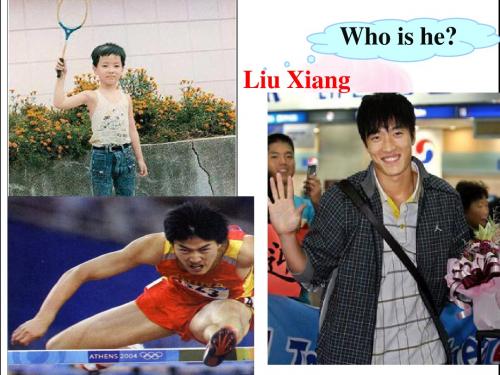
Practise
我妈妈为我而感到骄傲。 My mother is proud of me. =My mother takes pride in me.
4.Though he missed some competitions from then on, he......
from now on 从现在起 from then on 从那时起 from 2008 on 从2008年起
C. Read para 4 ,find the two most important prizes that Liu Xiang has won.
It was also the first time that an Olympic gold medal for hurdling was hung round the neck of a sportsperson from an Asian country.
Who is he? Liu Xiang
Module 8 Sports life Unit 2 He was invited to competitions around the world.
Aims:
1. To be able to understand the passage about Liu Xiang and know about some specific (具体的) information 2. To learn some important words and useful expressions (表达) 3. Develop some interests in sports
encourage v. 鼓励 encourage sb. to do sth.
high jump跳高
英语外研版九上M8U2
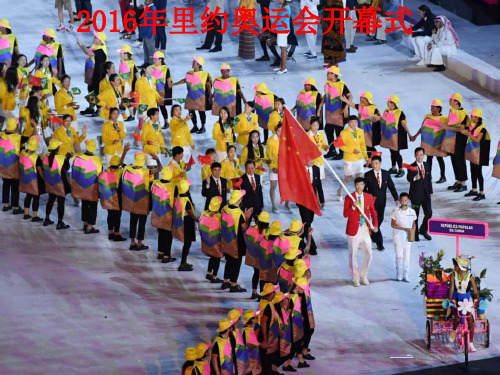
中国里约奥运夺金回顾 高清(360P).qlv
Liu Xiang
Module 8 Sports life
Unit 2 He was invited to competitions
around the world.
1.Look at the picture and the title of the passage in Activity 2. Say what you know about Liu Xiang and how he became a sports hero.
Do you know who she is? Zhang Yining
1.Coach Wang Biling noticed Zhang Yining.
ZhNaonwg YwinriitnegswenatsennocetisceadbobuytCtoaabcleh WatenngnBisilpinlagy. er Zhang Yining. Use the
6.Look at the verb forms in the two sentences.
Sun Haiping noticed Liu Xiang’s ability in hurdling.
Liu Xiang’s ability in hurdling was noticed by Sun Haiping.
(Grade
1983
4)___c__
d) won Olympic gold medal e) started training at a sports
school f) returned to first place g) suffered from foot problem
M8 Unit 2
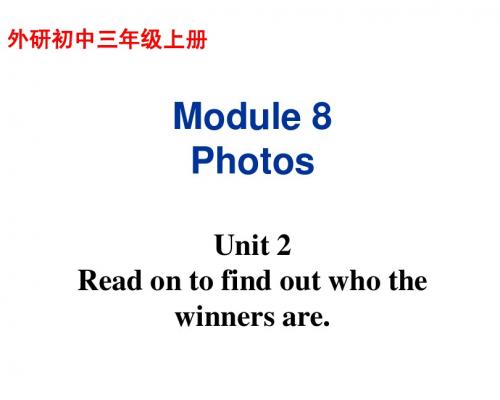
4. movement n. 1) 运动,活动 他躺在那里,一动也不动 He lay there without movement. 2) 动作,姿态 3) 倾向;动向;变迁 时下服装设计趋于朴素。 There is a movement towards simple designs in clothing.
5. feature n. 1) 特征,特色 [(+of)] 这是我们社会的一个主要特点。 This is a key feature of our society. 2) 面貌,相貌 他能够回想起她的容貌。 He could recall her features
6. rich adj.
2) 丰富的;富于……的,有很多……的 这些年来,他取得了丰富的经验。 He has gained rich experience in these years. 这个国家资源丰富。 The country is rich in resources.
外研初中三年级上册
Module 8 Photos
Unit 2 Read on to find out who the winners are.
Let’s have a look!
Language points
1. Compared with other years, we received many more photos. 和往年相比,我们收到的相片多 了很多。
Useful expressions Nhomakorabea• be pleased with • compared with • even enough • take photos • far from home • manage to do • thanks to sb • agree to do • at the end of
九年级英语M8Unit2
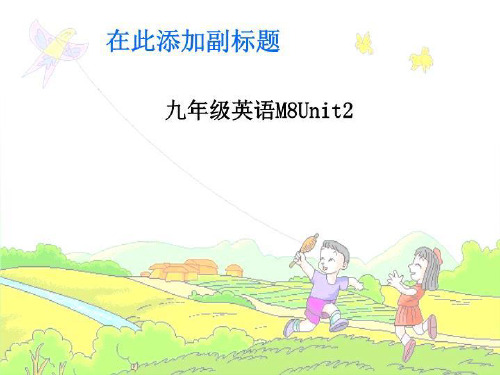
(中央车站) :restaurants
The city never sleeps.
Look, listen to the passage and answer the questions.
Which paragraph describes P2
what you can see in the photo?
Jazz
Greenwich Village (jazz clubs);
Blue Note
Opera
Metropolitan Opera House
Entertainment Theatre
In New York
Broadway; Central Park (open-air Shakespeare)
谢谢观赏
① What do you think are the Bronx and the Battery? Where are they?
The Bronx is a district in the north of Manhattan and the Battery is a park at the south. ② Why does the writer say New York is probably the entertainment capital of the world? Because it has so many different forms of entertainment.
Read the passage and complete the column In New York with notes.
Entertain-
In New York
- 1、下载文档前请自行甄别文档内容的完整性,平台不提供额外的编辑、内容补充、找答案等附加服务。
- 2、"仅部分预览"的文档,不可在线预览部分如存在完整性等问题,可反馈申请退款(可完整预览的文档不适用该条件!)。
- 3、如文档侵犯您的权益,请联系客服反馈,我们会尽快为您处理(人工客服工作时间:9:00-18:30)。
Homework
1. Read the passage again and review the new words and expressions. 2. Write something about your idea of choosing birthday presents (30-50字).
一、单项选择。
1. Jim buys a new bike ___ himself. A. to B. for C. on 2. She likes ____ and she reads ___ book. A. reading; a lot B. reading; lots of C. to read; lot of 3. He __ sees some films on the computer. A. usually B. never C. so
②
③
④
⑤
⑧
⑥ ⑨
⑦Leabharlann Which presents do you choose?
• • • • •
1、Daming’s grandparents: 5 2、Daming’s mother: 3 4 7 3、Betty’s cousin: 2 8 4、Tony’s sister: 1 6 5、Lingling’s aunt and uncle: 9
4. Lingling’s father doesnt go to s ’t football matches. He watches TV. 5. Damingss mother doesn t wear jeans. ’ ’t
Make a list of things you and your partner like and do. Things you like Things you do You play football … get up early … Your partner A description of you My name is … I like … I always… A description of your partner My partner’s name is… She/He likes… She/He often…
choose, lots of, go to the cinema, on television, never do sth., like doing sth.
1. To preview the use of present
simple, adverbs of frequency and possessive adjectives; 2. To practise the vocabulary.
If your birthday is tomorrow, what presents would you like? Why?
Work in pairs. A: What would you like for your birthday party? B: (I’d like) A box of chocolates.
2. She also likes films and often goes to the cinema, … 她也喜欢电影,经常去电影院…… go to the cinema 意为“去看电影”。 类似的短语还有: 去听音乐会 concerts go to a football match 去看足球比赛 去看篮球比赛 basketball matches
read & answer Daming’s grandparents
Daming’s mother Lingling’s aunt and uncle
who
Betty’s cousin Tony’s sister
Who are we going to choose presents for?
①
Module 8
Choose presents
Unit 2
She often goes to concerts.
Words and expressions CD concert magazine scarf silk dress T-shirt choose n. 光盘;激光唱片 n. 音乐会 n. 杂志 n. 围巾 n. 丝绸 n. 连衣裙;礼服 n. T恤衫 v. 选择;挑选
n. 电影 n. 歌曲 n. 比赛,竞赛(尤指体育) n. 周末 在周末
Objectives: 1. To understand the passage “Choosing birthday presents”; 2. To learn to use some adverbs of frequency: always, often, usually, sometimes, never 3. To learn to cherish our friendship.
1. She spends a lot of money. 她花了很多钱。 spend作动词,意为“花(钱),花费(时 间)”,一般用表示人的名词作主语。常见用 法有: ★spend + 名词 花(费)…… ★spend + 时间 / 金钱+ on sth在……上花费 时间 / 金钱 ★spend + 时间 / 金钱+ (in) doing sth花费时 间 / 金钱做某事 Tom spends a lot of money every day. Jack spends ten yuan on this present. I spend three hours (in) cleaning the room.
4. 他们花了一个小时踢足球。 spend They _____ one hour (in) playing football. 5. 你和谁一起去音乐会? Who do you __ __ ___ concert with? go to the _______ 6. 你昨天看足球比赛了吗? Did you watch ___ _______ ______ _____ the football match yesterday?
Quiz
二、按要求完成句子。
1. His favorite food is rice. (改为同义句) He _____ rice best ____. likes 2. She plays the piano and likes to sing. (改为否定句) She _______ play the doesn’t ____ piano __ like to sing. or
Writing
Write these sentences with “ ’ ” (apostrophe). 1. Damingss uncle likes books, but he ’ doesn’t like football. t 2. Betty’s aunt and uncle like the cinema. s Their favourite film is Lord of the Rings. 3. Tony’s sister often buys CDs by her s favourite singers.
Words and expressions exercise n. 锻炼;练习 wear v. 穿;戴 expensive adj. 昂贵的 shoe n. 鞋,鞋子 spend v. 花(钱); 花费 money n. 钱,金钱
Words and expressions
film song match weekend at weekends
a lot of 相当于 lots of “许多,大量”, 后 面接不可数名词, 相当于much。后面接可 数名词复数形式时, 相当于many。
There is lots of/a lot of/much food in the fridge. 冰箱里有许多食物。 a lot of 与lots of 多用于肯定句, 在否定句和疑问句中多用many或much。
三、根据汉语提示完成句子。 1. 她没有多少衣服。 She ______ ____ any clothes. hasn’t got 2. 迈克的爷爷经常听音乐。 listens to _____. Mike’s grandpa often____ ____music 3. 她花了50元买这件衬衫。 I ______ fifty yuan __ this blouse. spend on
3. He often goes to the cinema. (改为一般疑问句) go ____ Does he often ___ to the cinema? 4. Betty’s aunt and uncle live in the USA. (就划线部分提问) ______ __ Betty’s aunt and uncle ___? Where do live 5. We often read English novels. (改为由Let’s开头的祈使句) ____ read Let’s ____ English novels.
go 之后加 to 跟宾语, 可构成一些动词 短语。 go to school 上学
go to the film 去看电影 go to the doctor 去看病 go to bed 上床睡觉
Free talk
Suppose: Tomorrow is your father’s birthday, what are you going to send him? Why? My father likes running/…, so I am going to send him a pair of trainers/… reading/books/magazines /films/candy/clothes /music/football /basketball/table tennis/…
